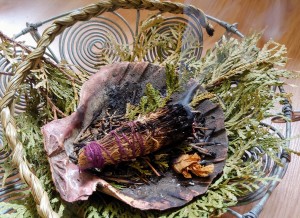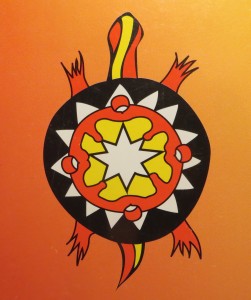“Our purpose as human beings,” I was told years ago by an old man of Cree ancestry, “is not to try to understand who or what Creator is, but rather, it is to heap daily praise on the abundance Creator placed before us, helping human beings to live well.” The old man I speak of possessed a rich and extraordinary type of wisdom, born at a time long ago before human beings even took their first steps on Mother Earth. I can honestly say that I have not come across such a strong-willed and spirited individual very often in all my 68 years of life. His spiritual beliefs were profound and beautiful. They were strong in the way of healing.
I sat with him as often as possible and heard his forlorn reflections on the wrongs people of this wasteful world are guilty of. “We all should make an effort to make the world better for our children” are words he spoke each day of his life. “We are all guilty of wastefulness,” he told me once, “and we’ll never overcome it without spiritual assistance.” Never in all my counsels with him, did I hear the old man mention the word “sin.”
Who defines what a sin is? By what means does Creator measure the weight of a sin? The Indigenous Peoples of this land who embrace the spiritual beliefs given to them by Creator many thousands of years ago, know very well that it is the waters, trees, animals, fish and birds on whose backs many of the sins committed by human beings are placed upon. What we abused and destroyed of Creator’s making is assured a say on what will become of us on the Day of Reckoning. The bird or plant who became extinct because of our actions, the animal who endured a long and agonizing death while in the merciless grip of a leg-hold trap, the once pure waters of an underground spring now filled with poisons, these things will have their chance to finally be heard. What will they say about us to Creator? When we do wrongs or commit “sins” against the noble and magnificent things of our lands, we need to accept that we will face severe consequences for doing so at some point in the future. Our souls will not escape justice. Of this I am certain!
 The Indigenous spiritual beliefs of the Anishinabe (First Peoples) never hurt anyone! Yet, many generations of Christians were told by their faith leaders that Indigenous spiritual beliefs were like a dark and threatening cloud pushed furiously forward and locked into the minds of savages by the scalding breath of the “devil.” Because of this and because of Canada’s Christian foundation, Indigenous Spirituality was outlawed until into the 1950’s. To me at least, a monstrous sin was committed by Canada for making it a crime to sing a beautiful song to Creator with the help of a drum or rattle.
The Indigenous spiritual beliefs of the Anishinabe (First Peoples) never hurt anyone! Yet, many generations of Christians were told by their faith leaders that Indigenous spiritual beliefs were like a dark and threatening cloud pushed furiously forward and locked into the minds of savages by the scalding breath of the “devil.” Because of this and because of Canada’s Christian foundation, Indigenous Spirituality was outlawed until into the 1950’s. To me at least, a monstrous sin was committed by Canada for making it a crime to sing a beautiful song to Creator with the help of a drum or rattle.
But at long last, a church has seen fit to apologize to the First Nations, Inuit and Métis Peoples for the spiritual harm the actions and deeds of the church brought to Indigenous spirituality. Many segments of Christian religions are guilty but only the Anglicans have so far admitted that their condemnation of Indigenous spirituality was wrong. The Anglicans are brave and I believe, righteous. They are ahead of their time! I have a relationship of mutual respect going on presently, with the Anglicans. It is one of trust, peace and friendship and also, one of real reconciliation. I am extremely proud of the friendship I have with them. Thank God for the Anglican Church!


You are very forgiving. I don’t think the Anglican Church apology suits the crime. It is was a spiritual destruction and much more. What are they doing to help fund the trauma counseling needed for example. What are they doing with the perpetrators besides blacking out their names from witness testimony. Nope. I wouldn’t be so forgiving.
Dr. Gita Arian Baack
I do think it important to add this, in addition to our personal communication, [as I wrote] “for people who read your blog and will think there were no other apologies, or otherwise [won’t] understand.” I was referring to what you wrote above, that “… only the Anglicans have so far admitted that their condemnation of Indigenous spirituality was wrong.”
At least four church organizations in Canada have issued previous apologies to Indigenous, mainly with respect to Residential Schools:
* Anglican Church of Canada (1993)
* Presbyterian Church of Canada (1994)
* United Church of Canada (1998)
* Missionary Oblates of Mary Immaculate (2001)
The four texts can be found at this link: http://caid.ca/Dchurch_apology.html
I thought to quote sections from two of them, that were more encompassing than only mentioning the Residential Schools actions they had committed.
(This is not to communicate an endorsement, but simply to present highlights of their words as they themselves articulated their apologies).
1) From the Presbyterian Church of Canada:
“We acknowledge that the stated policy of The Government of Canada was to assimilate Aboriginal peoples to the dominant culture, and that The Presbyterian Church in Canada co-operated in this policy. […] As part of that policy we, with other churches, encouraged the Government to ban some important spiritual practices through which Aboriginal peoples experienced the presence of the creator God. For the Church’s complicity in this policy we ask forgiveness.”
2) From the Missionary Oblates of Mary Immaculate:
“We apologize for the part we played in the cultural, ethnic, linguistic, and religious imperialism that was part of the mentality with which the peoples of Europe first met the aboriginal peoples and which consistently has lurked behind the way the Native peoples of Canada have been treated by civil governments and by the churches. We were, naively, part of this mentality and were, in fact, often a key player in its implementation. […]
For the part that we played, however inadvertent and naive that participation, might have been, in the setting up and maintaining of a system that stripped others of not only their lands but also of their cultural, linguistic, and religious traditions we sincerely apologize.”